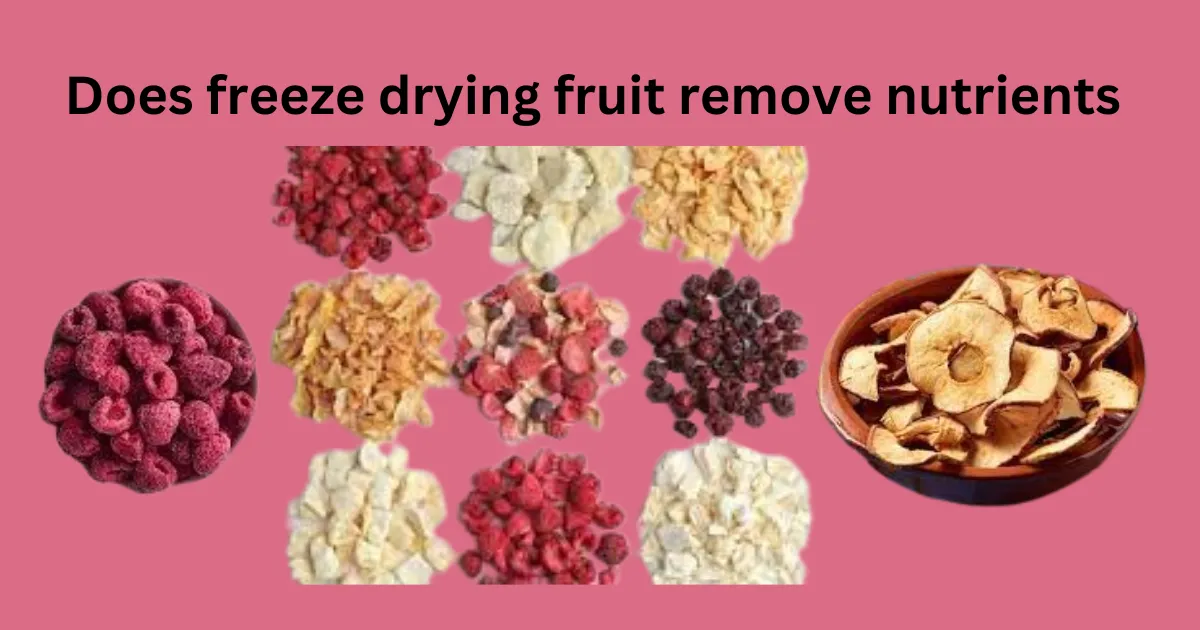Does freeze-drying fruit remove nutrients? If you are someone who loves fruits and gives a lot of importance to their nutritional benefits, then you must have wondered about the effect of freeze-drying on their nutrient content. Freeze-drying is a popular way to preserve fruits while maintaining their flavor and texture. However, does this preservation process compromise the nutritional integrity of the fruit? Let us think deeply about this topic. And we, and all of you, find out whether freeze-drying spoils or eliminates nutrients from fruits.
Understanding Freeze Drying
Before we discuss the effects of freeze drying on fruit nutrients, it is important to understand what freeze drying actually means. Freeze drying, also known as lyophilization, is a dehydration process that involves freezing the fruit and then removing the ice crystals formed within it by sublimation, in which the ice changes directly into vapor without going to the liquid phase.. Is or gets changed.
This process helps preserve the structure, flavor, and nutritional content of the fruit by removing water content without causing any damage to the cellular structure of the fruit. Freeze-dried fruits are very popular for their long shelf life and convenience, making them a common choice for snacks, breakfast cereals, and baking ingredients.
Nutrient Preservation in Freeze-Dried Fruit
The preservation of nutrients during freeze-drying depends on several factors, including the type of fruit, pre-treatment methods, and the freeze-drying process. Fruits are rich sources of essential vitamins, minerals, fiber, and antioxidants, which contribute greatly to their nutritional value and health benefits.
When freeze-drying fruits, using low temperatures helps reduce the degradation of heat-sensitive nutrients such as vitamins and enzymes. Additionally, rapid moisture removal prevents the growth of microorganisms, thereby maintaining the nutritional integrity of the fruit.
Effects on Nutrient Content
While freeze drying is generally considered one of the best ways to preserve the nutritional content of fruits, it does lead to some loss of nutrients. The extent of loss of nutrients in fruits can vary depending on factors such as size and type of fruit, freezing and drying conditions, and duration of the process.
Some nutrients, such as vitamin C and some B vitamins, are more sensitive to degradation during the freeze-drying process. However, some studies have shown that freeze-dried fruits still retain a significant portion of their original nutrient content, making them a nutritious choice for consumption.
Advantages and disadvantages of freeze-dried fruit
Advantage
- Extended Shelf Life: Freeze-dried fruits have a longer shelf life compared to fresh fruits, making them convenient for storage and transportation.
- Retention of Flavor and Texture: Freeze drying preserves the natural flavor, color, and texture of fruits, enhancing their appeal to consumers.
- Nutritional Retention: Despite some loss of nutrients, freeze-dried fruits still retain a substantial amount of their original nutritional content, making them a healthy snack option.
Disadvantage
- Nutrient Loss: Freeze drying can lead to some loss of heat-sensitive nutrients. Although the extent varies depending on factors such as processing conditions and fruit type.
- Cost: Freeze-dried fruits can be more expensive than fresh or traditionally dried fruits. Due to the specialized equipment and processes involved.
- Environmental Impact: The energy-intensive nature of freeze drying and the packaging materials used can have environmental implications, contributing to carbon emissions and waste generation.
Conclusion of Freeze Drying Fruit Remove Nutrients
In conclusion, freeze drying is an effective method of preserving fruits while retaining much of their nutritional value. While it does result in some loss of nutrients, freeze-dried fruits still offer a convenient and nutritious snack option. By carefully controlling the freezing and drying conditions. It is possible to minimize nutrient loss and ensure the quality of the final product. Ultimately, freeze-dried fruits can be a valuable addition to a balanced diet, providing essential vitamins, minerals, and antioxidants in a convenient and shelf-stable form.
FAQs of Freeze Drying Fruit Remove Nutrients
Are freeze-dried fruits healthy?
Yes, freeze-dried fruits are healthy as they retain much of their original nutrient content despite the preservation process.
How do freeze-dried fruits compare to fresh fruits nutritionally?
While freeze-dried fruits may have a slightly lower nutrient content compared to fresh fruits. They still offer valuable vitamins, minerals, and fiber.
Can freeze-dried fruits be rehydrated?
Yes, freeze-dried fruits can be rehydrated by soaking them in water or adding them to recipes that require moisture.
Do freeze-dried fruits contain added sugars or preservatives?
Some commercially available freeze-dried fruits may contain added sugars or preservatives for flavor enhancement and extended shelf life. It’s essential to check the ingredient list for any additives.
How should freeze-dried fruits be stored?
Freeze-dried fruits should be stored in a cool dry place. Away from moisture and direct sunlight to maintain their quality and shelf life.
